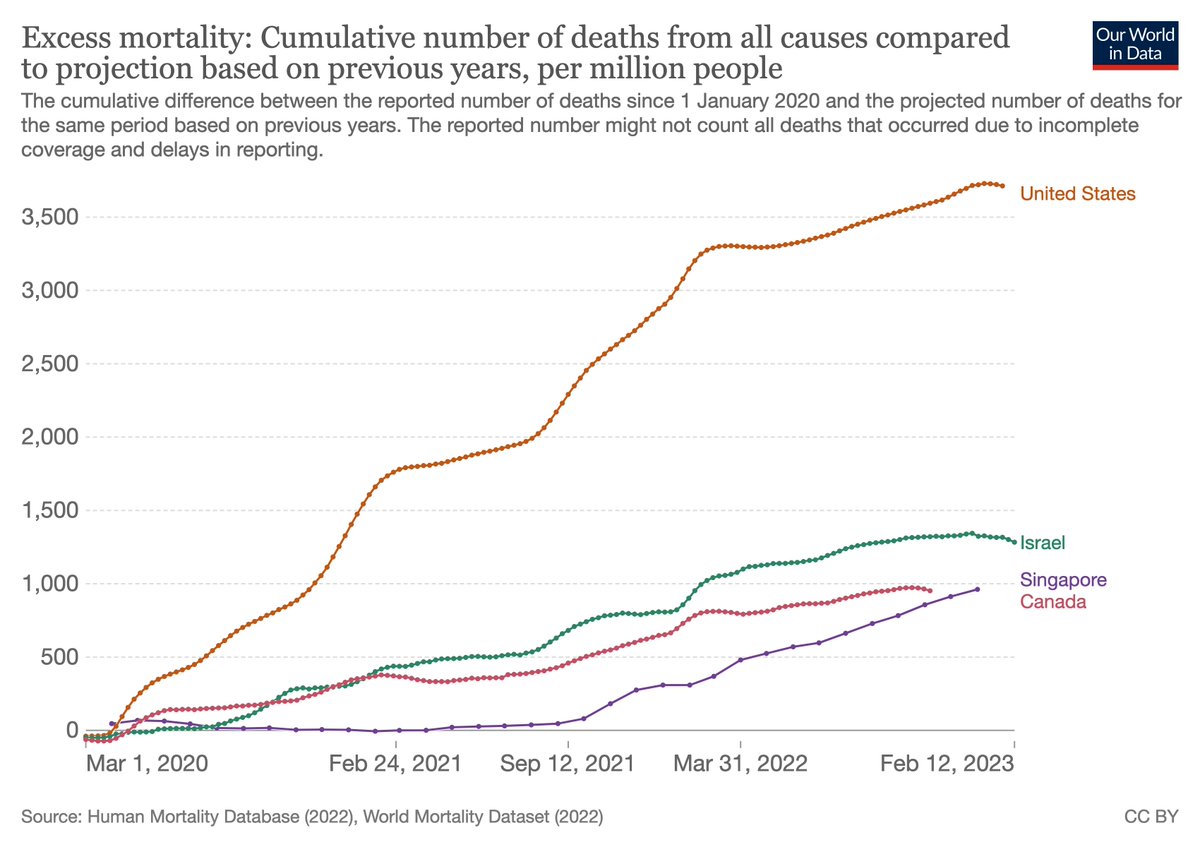Reckoning with the Covid Pandemic
The past three years of fighting Covid have been a fog of war. We must reckon with how bad the pandemic was, and how much worse it could have been. Some places had much lower rates of infections, hospitalizations and deaths, and the pandemic could have been deadlier.

Dr. Tom Frieden
Global health leader and epidemiologist. President and CEO of @ResolveTSL. Former @CDCgov director and @nycHealthy commissioner. Focused on saving lives.

-
The past three years of fighting Covid feel like a fog of war. Although everyone wants to move on, we must reckon with how bad the pandemic was—and how much worse it could have been. 1/thread
— Dr. Tom Frieden (@DrTomFrieden) March 17, 2023 -
20 million excess deaths have occurred during the Covid pandemic—more than all but the two other leading causes of death, cardiovascular disease and cancer. Without vaccination, measures to reduce infections and lifesaving medical care so many more lives would have been lost. 2/
— Dr. Tom Frieden (@DrTomFrieden) March 17, 2023 -
Those who are intent on undermining public health action argue that there was nothing we could have done to counter Covid, that all of the infections and deaths were inevitable. But they ignore that some places had much lower rates of infections, hospitalizations and deaths. 3/
— Dr. Tom Frieden (@DrTomFrieden) March 17, 2023 -
Astonishingly, the pandemic could have been deadlier. The first year of vaccination alone is estimated to have prevented more than 14 million deaths globally. 4/
— Dr. Tom Frieden (@DrTomFrieden) March 17, 2023 -
Areas that made good use of vaccination, masking and strategic closures had death rates that were 40-70% below the global average. 5/
— Dr. Tom Frieden (@DrTomFrieden) March 17, 2023 -
If the lower death rates of countries such as Canada, Singapore and Israel that skillfully implemented these measures had been achieved in all countries, between eight million and 14 million of the people killed by the pandemic would be alive today. 6/ pic.twitter.com/XDRPmlLQ3U
— Dr. Tom Frieden (@DrTomFrieden) March 17, 2023 -
In the U.S., 1.1 million people had died from Covid by the end of 2022.
— Dr. Tom Frieden (@DrTomFrieden) March 17, 2023
It could have been a lot worse: vaccines likely saved at least 500,000 lives in the U.S. and possibly twice that many. Closures, masking and medical treatments further reduced deaths. 7/ -
But if the overall death rate had been as low as in the best-performing states in the contiguous U.S. (Vermont, Utah, Washington, Maine, New Hampshire and Oregon), nearly half of the deaths would not have occurred. 8/
— Dr. Tom Frieden (@DrTomFrieden) March 17, 2023 -
These failures continue. Approximately 95% of the people dying today from Covid in the U.S. are not up to date on their vaccines, and three-quarters of the people at highest risk don’t receive Paxlovid. 9/
— Dr. Tom Frieden (@DrTomFrieden) March 17, 2023 -
Covid vaccines arrived much sooner than we dared to hope, but the world may not be so lucky next time: An effective vaccine might be elusive. 10/
— Dr. Tom Frieden (@DrTomFrieden) March 17, 2023 -
Public health action is crucial, and it succeeds when it is tightly tied to real-time data and the decision-making process of balancing costs and benefits is transparent. 11/
— Dr. Tom Frieden (@DrTomFrieden) March 17, 2023 -
Here’s a striking fact: Covid killed more Americans than the number of soldiers that who were killed in all of our wars combined, but we spend hundreds of times more on military defense than on our health defense. 12/
— Dr. Tom Frieden (@DrTomFrieden) March 17, 2023 -
To respond better to future health threats, we must finally invest in a more comprehensive health architecture in the U.S. and globally. We need improved vaccine production and distribution, better data and more collaboration. 13/
— Dr. Tom Frieden (@DrTomFrieden) March 17, 2023 -
If we know when and where health threats emerge and spread, we can stop outbreaks before they become pandemics. A key step to improve our defenses is wider adoption of the 7-1-7 target for fast detection, reporting and control of health threats. 14/ https://t.co/Cfrhf23C53
— Dr. Tom Frieden (@DrTomFrieden) March 17, 2023 -
The next pandemic is sure to come. But with better data driving faster detection and more effective responses to health emergencies, we can prevent millions of deaths and trillions of dollars in economic losses. Read my new piece in @WSJ: https://t.co/ilHcW4vP4p 15/end
— Dr. Tom Frieden (@DrTomFrieden) March 17, 2023
